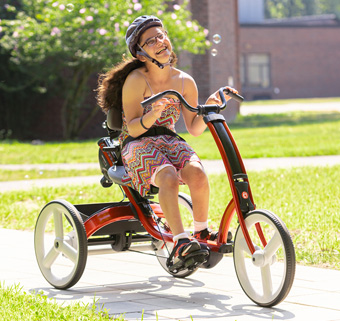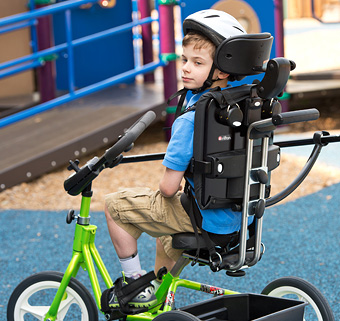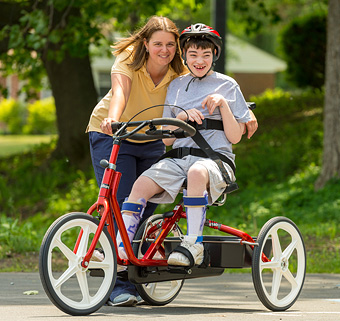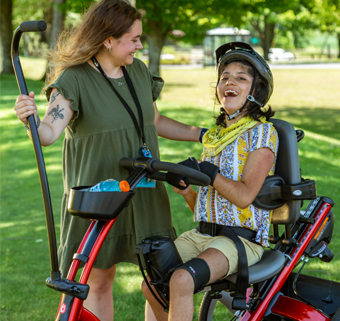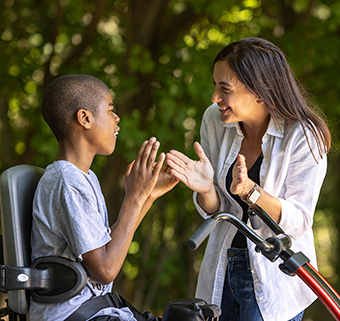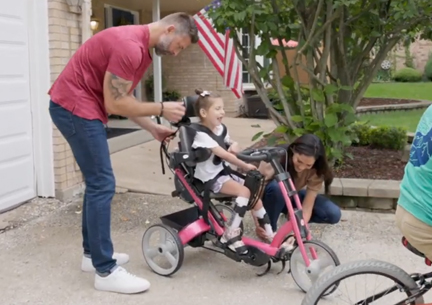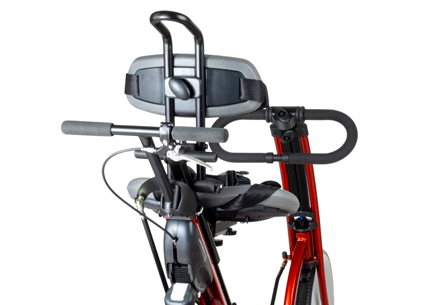Evidence Update: Maintenance of Functional Gains Following an Adaptive Cycling Program
| November 2022 For children with disabilities, adaptive cycling provides motivating and therapeutic opportunities to build muscle strength, and improve range of motion, balance and hand-eye coordination. As a result, adaptive cycling as an intervention is gaining traction with a growing body of focused research to support its use.
For children with disabilities, adaptive cycling provides motivating and therapeutic opportunities to build muscle strength, and improve range of motion, balance and hand-eye coordination. As a result, adaptive cycling as an intervention is gaining traction with a growing body of focused research to support its use.
In 2019, Armstrong and colleagues published the first systematic review and meta-analysis to assess the efficacy of cycling interventions in children and adolescents with cerebral palsy.1 This review looked at nine studies with a total of 282 participants who were two to 18 years old, with mixed walking capabilities. The review concluded that adaptive cycling could improve muscle strength, balance and gross motor functioning in children with cerebral palsy. The authors encourage further research to determine the functional retention of skills gained through adaptive cycling, and to determine optimal dosing parameters.
In 2019 and 2020, Armstrong and colleagues first published a research protocol, and then explored adaptive cycling with a randomized controlled trial that examined the efficacy of coupling different forms of cycling with goal-directed training for children with cerebral palsy.2, 3 Researchers recognized that adaptive cycling in a community-based environment required the child to overcome ground resistance and hone their navigational skills. Armstrong therefore added functional electrical stimulation (FES) cycling to the intervention to improve overall adaptive cycling outcomes.
The focus population for this trial included twenty-one children, ages six to 18 years, who were not independently ambulant in GMFCS levels II-IV. After eight weeks of the combined cycling intervention, these children showed gains in gross motor function, goal performance, satisfaction and peak cycling resistance compared to the control group.
Then in 2022, to address the research gap in their initial systematic review, Armstrong and colleagues examined whether these children retained the gains from the FES-assisted and goal-directed program.4 The researchers found that eight weeks after the program, the children continued to demonstrate clinically important gains in gross motor function, improvements in goal performance and satisfaction, cycling resistance, sit-to-stand speed, and capacity for activities of daily living.
These findings endorse adaptive cycling as an effective and promising intervention to improve motor and social outcomes for children with cerebral palsy. Adaptive cycling intervention, beyond its motivational fun, demonstrates a measurable therapeutic impact that can prepare the child with disabilities for a more functional future.
References
- Armstrong EL, Spencer S, Kentish MJ, Horan SA, Carty CP, Boyd RN. Efficacy of cycling interventions to improve function in children and adolescents with cerebral palsy: a systematic review and meta-analysis. Clin Rehabil. 2019;33(7):1113–29.
- Armstrong EL, Boyd RN, Kentish MJ, Carty CP, Horan SA. Effects of a training programme of functional electrical stimulation (FES) powered cycling, recreational cycling and goal-directed exercise training on children with cerebral palsy: a randomised controlled trial protocol. BMJ Open. 2019;9(6):1-17
- Armstrong EL, Boyd RN, Horan SA, Kentish MJ, Ware RS, Carty CP. Functional electrical stimulation cycling, goal-directed training, and adapted cycling for children with cerebral palsy: a randomized controlled trial. Dev Med Child Neurol. 2020;62(12):1406-1413.
- Armstrong EL, Boyd RN, Horan SA, Kentish MJ, Ware RS, Carty CP. Maintenance of functional gains following a goal-directed and FES-assisted cycling program for children with cerebral palsy. Pediatr Phys Ther. 2022;34:480-7.
